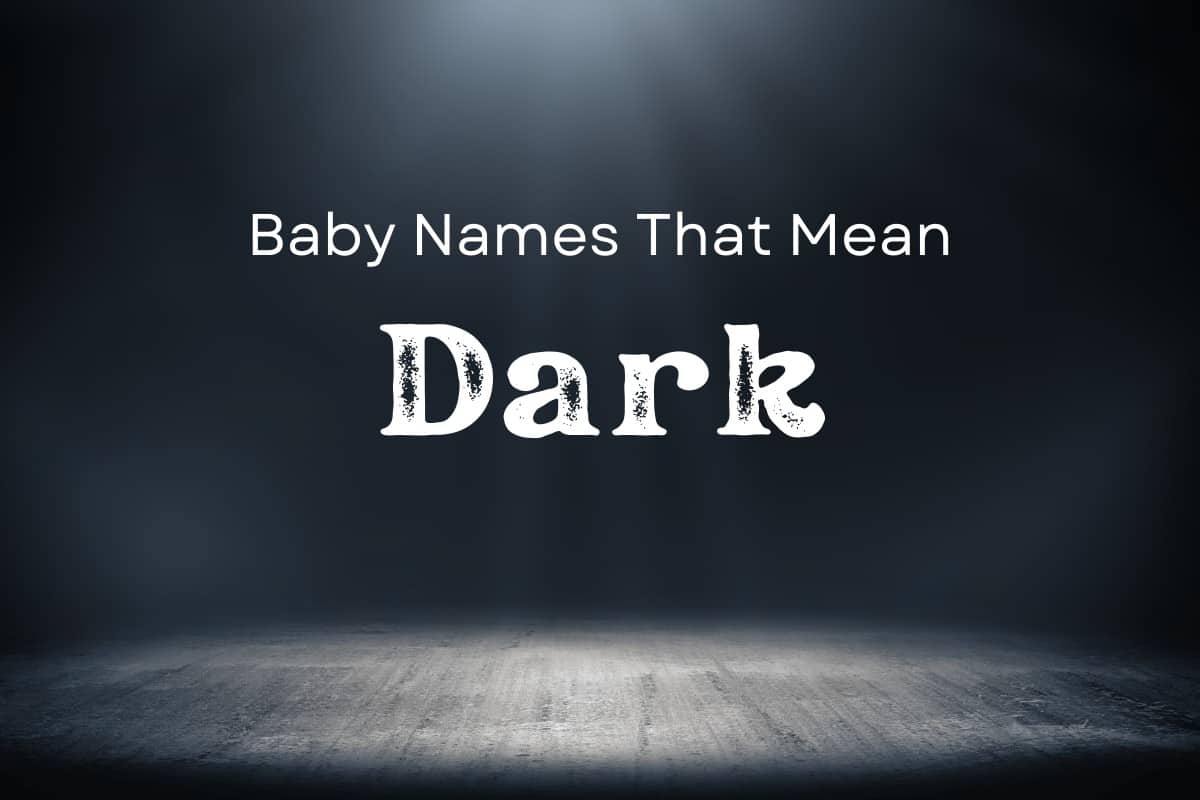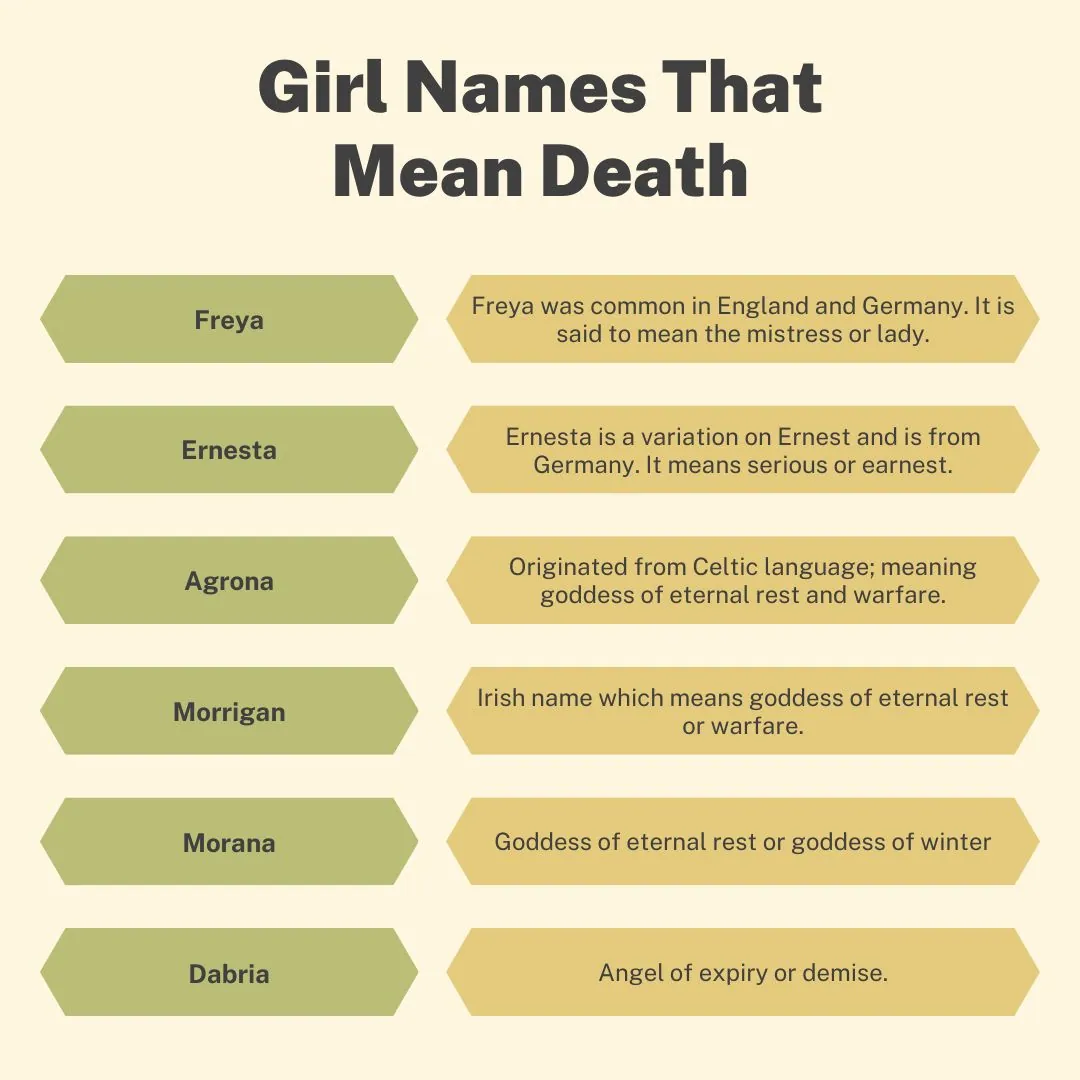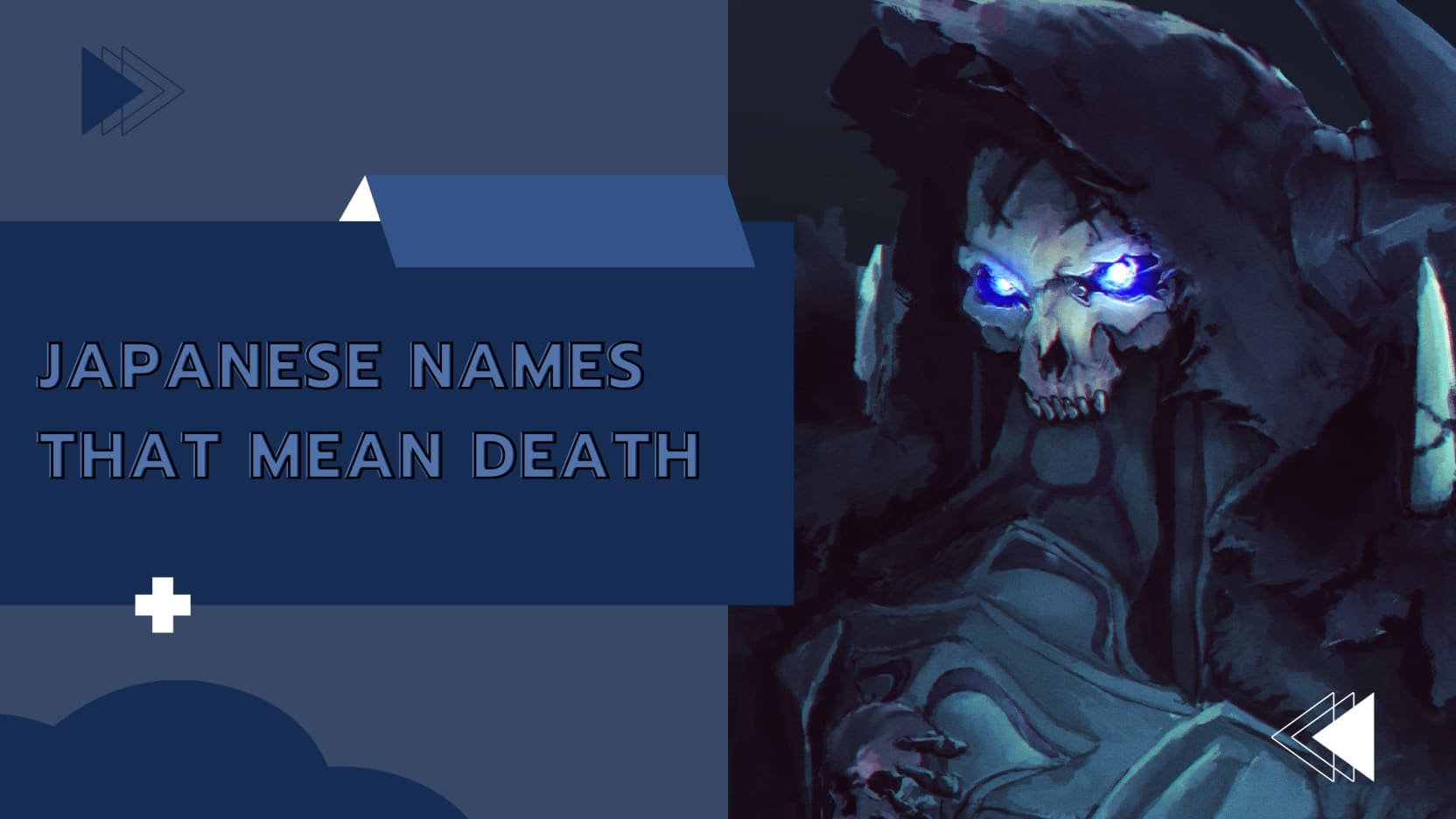Surnames That Mean Darkness Or Death: Uncovering Their Intriguing Origins
Have you ever stopped to ponder the true meaning behind your family name, or perhaps wondered about the hidden tales some surnames carry? It's a rather fascinating thought, isn't it? Today, we're taking a closer look at surnames that mean darkness or death, names that, in some ways, echo tales from long ago. These aren't just words; they are echoes of history, little linguistic time capsules that give us a peek into past lives and places. So, you know, it's pretty neat to think about how these names came to be.
Sometimes, a surname can tell us a whole lot about where someone lived, what they did, or even how they looked. As a matter of fact, surnames often spring from the place where someone came from or lived, like near a distinctive geographical feature, for example. We see this quite a bit in England, where this kind of surname is, you know, very common. It's truly amazing how many different ways names can pop up and stick around.
This exploration isn't just about finding names that sound a bit spooky; it's about understanding the rich tapestry of human history woven into our identities. It's about seeing how people from generations past were named and why. Frankly, it gives us a fresh perspective on the stories that shape us, even if they're, like, a little bit on the shadowy side. We will look at some of these names and consider their origins.
Table of Contents
- What Makes a Surname Carry a Dark Meaning?
- Surnames Connected to Darkness and Night
- Surnames Linked to Death or Mortality
- How These Names Came to Be
- The Human Story Behind the Names
- Researching Your Own Surname
- People Also Ask About Dark Surnames
What Makes a Surname Carry a Dark Meaning?
When we talk about surnames that mean darkness or death, we're really looking at names whose original sense or root word pointed to something somber, perhaps something mysterious, or even something tied to the end of life. These meanings aren't always obvious today, as language changes over time. But, you know, if you dig a little, you can often find some very old connections. It's not about the people themselves being dark, but about the words chosen long ago to describe them or their surroundings. So, it's pretty much about etymology, the study of word origins.
There are, in fact, eight main types of surname, and names with a darker feel can fall into several of these categories. For instance, some might come from a place name that had a grim association, or perhaps they were given to someone who worked in a particular, let's say, less cheerful job. It's a bit like finding a clue from a very old puzzle, honestly. We can often find clues about these names in historical records, like those from the National Health Service Central Register, which holds a database of around 60 million names. This kind of information helps researchers, you know, piece together the story.
It's important to remember that these meanings often reflect the world as it was centuries ago. Life was, in some ways, much harder and more directly connected to natural cycles, including darkness and mortality. A name that meant "dark forest" might just have described a shadowy place, not something inherently evil. So, it's really about understanding the context of the past, which is, you know, pretty cool when you think about it.
Surnames Connected to Darkness and Night
Some surnames literally mean "black" or "dark," reflecting either a person's appearance, their dwelling, or even a local feature. For instance, the surname 'Black' is a pretty clear example. It could have described someone with dark hair or a dark complexion, or perhaps someone who lived in a very shadowy spot. Similarly, names like 'Cole' or 'Kohl' come from words meaning "coal," which is, of course, very dark. These names, in some respects, are quite straightforward in their origins. They just describe something visually. You know, it's a simple observation that became a lasting identifier.
The Resilience of Color Surnames
Intriguingly, some common noun surnames have resisted modification over time. Notably, the surnames ‘Black’ and ‘Flint’ – colors as surnames – seem particularly resilient to amendment. This means they've stayed pretty much the same for centuries, which is, you know, rather unusual for surnames. Flint, for instance, is a dark, hard stone, and its use as a surname could suggest someone who lived near flint deposits, or perhaps someone with a very tough or, in a way, "dark" disposition, though that's less common. It's fascinating how some names just stick around without much change, almost like they're determined to keep their original form.
Other names might hint at darkness in a more poetic sense. Think of names that derive from words for "night" or "shadow." While less common in English, many European languages have equivalents. For example, some German names might come from "Nacht" (night) or similar roots. These names typically describe a person's connection to a place or perhaps an event that happened at night. So, in short, the meaning can be quite literal or a bit more evocative, depending on the name's history. It's really about tracing those linguistic threads back in time, which, you know, can be a bit tricky sometimes.
Surnames Linked to Death or Mortality
Surnames that directly mean "death" are, in fact, quite rare, but some certainly carry associations with mortality or the grim. One famous example is 'Mortimer,' which literally means "dead sea" or "dead lake" from Old French. This name would have been given to someone from a place called Mortemer, which, you know, sounds pretty somber. It's a locational surname, derived from the place where someone came from or lived, and it just happened to have a rather stark meaning. This is, you know, a very clear example of how a place name could carry such a weighty sense.
Another category includes names that might have been associated with occupations related to death, though these are even rarer as direct surnames. For instance, names that might have belonged to grave diggers or undertakers, though typically these roles would have been described by more functional terms. Sometimes, a name could be linked to a significant event, like a battle or a plague, but again, these links are often indirect. So, it's not always a straightforward connection, but the hints are often there if you look closely enough. It's, like, a puzzle to solve.
Consider also names that have a sense of "grim" or "stern" within them. While not directly "death," they convey a serious or unyielding character. These could be descriptive names, given to someone based on their personality or demeanor. For instance, a name that means "stern" or "severe" could be seen as having a slightly dark edge, in a way. It's a subtle difference, but it adds another layer to how we perceive these old names. Frankly, the nuances of language from centuries ago are quite remarkable.
How These Names Came to Be
Surnames, as we know, didn't just appear overnight. They developed over centuries, typically to help identify people more clearly than just a single given name could. This is, you know, how most surnames come from somewhere. As a matter of fact, most surnames in England fall into a few main types. Understanding these types helps us figure out why some names ended up with meanings like darkness or death. It's a pretty logical system, when you get right down to it.
Locational Names
Many surnames derive from the place where someone came from or lived. If that place had a feature that was dark, shadowy, or perhaps even associated with something grim, the name could reflect that. For instance, a surname could be derived from a distinctive geographical feature, like a "black wood" or a "dark valley." This is, in some respects, a very common way for names to form. The 'Black' surname, for example, could have come from someone living near a place called 'Blackwood' or 'Blackley.' So, it's pretty much about geography shaping identity.
Similarly, a place name like 'Mortimer,' which means 'dead sea' or 'dead lake,' clearly falls into this category. People from that specific location would have taken that name. It's, you know, a very direct link between a person and their environment. These names are, arguably, some of the most enduring, as places tend to stay put, even if their names evolve a little. It's like a permanent address becoming a family identifier, which is, you know, pretty cool.
Occupational Names
While less common for "dark" meanings, some surnames came from a person's job. If an occupation had a connection to something somber, the name might reflect that. For example, a 'Cole' surname might not just be about the color; it could also mean someone who worked with coal, perhaps a charcoal burner. This job, in a way, involved working with a very dark substance and often in smoky, dark conditions. So, it's a subtle link, but a link nonetheless. It's, like, the work you did became your name.
However, it's rare to find direct occupational surnames that mean "death" because most such roles were described by their function rather than a morbid association. A "gravedigger" might have been known as 'Graves' or 'Digger,' which are descriptive of the work, but not inherently about "death" itself. It's a slight distinction, but an important one when looking at these specific meanings. You know, it's all about how language evolved over time to describe people's lives.
Descriptive Names
These surnames were given based on a person's appearance, personality, or a notable characteristic. A surname like 'Black' could also have been a descriptive name for someone with very dark hair or eyes, or perhaps a rather somber disposition. These names are, you know, quite direct. They just say what they see. It's a pretty straightforward way to name someone, honestly.
Sometimes, a descriptive name might have a slightly darker feel if it referred to someone who was perceived as stern, mysterious, or perhaps even a bit intimidating. While not meaning "death," these names could carry a certain gravity. It's, in some respects, about the impression someone made on their community. So, a name could reflect a person's presence, which is, you know, quite interesting when you think about it. It's a human way of labeling.
The Human Story Behind the Names
Behind every surname, there's a human story, a connection to someone who lived long ago. Even surnames that mean darkness or death are, at their core, about people. They tell us about where someone lived, what they looked like, or perhaps a trade they practiced. It's not about being ominous; it's about the everyday realities of the past. These names are, you know, living pieces of history, carrying whispers from generations we can only imagine. It’s pretty amazing to think about.
Researchers often start by following a single line of their own family, but move on to collecting wider information. This helps them build a fuller picture of how names spread and changed. For instance, you might find variant and deviant surnames, where a name slightly altered over time but kept its core meaning. This tells us about migration, changing accents, and how families adapted. So, it's really about the human journey, and stuff, that these names represent.
These names, with their intriguing meanings, remind us that our family histories are deeply intertwined with the language and landscapes of the past. They offer a unique window into the lives of our ancestors, connecting us to a time when names were, you know, very much about identification in a simpler, more direct way. It's a pretty profound connection, actually, when you consider it. We carry these echoes of history with us every day.
Researching Your Own Surname
If you're curious about your own surname, especially if it feels like it might have a connection to darkness or something similar, there are many ways to explore its origins. You can start by looking at general guides to the main sections of modern British surnames, for example. This can give you a good grounding in how names typically developed. Frankly, it's a great way to begin your own research journey. You know, it's all about finding those first clues.
Tools like a surname atlas can also be incredibly helpful. Howard Benbrook, for instance, gave a knowledgeable and engaging presentation called "Most Surnames Come From Somewhere," which talked about surnames in our usual webinar format, before providing a synopsis of the software, surname atlas. This kind of software can help you visualize where names originated and how they spread, which is, you know, pretty useful for understanding geographical links. It’s like having a map to your family's past, more or less.
Remember, sometimes a name that sounds a bit "dark" might have a very ordinary origin. It's all about digging into the linguistic history and geographical context. You can learn more about surname origins on our site, and also link to this page for more surname research guidance. It’s a rewarding pursuit, really, uncovering the stories behind the names we carry. You can also explore resources like the Guild Marriage Locator or Surname Cloud, which contain members’ records on FamilySearch, to see how names appear in historical documents. This is, you know, a very practical way to find information.
There are also records like the 1998 electoral rolls, which show new immigrant surnames. This kind of data helps us understand how surnames evolve and spread over time, and how new names enter the picture. So, it's not just about ancient names; it's about the ongoing story of names. You may find our other guild websites of interest, too, which offer even more avenues for research. It's pretty comprehensive, actually, the amount of information out there.
People Also Ask About Dark Surnames
Curiosity about surname meanings is, you know, pretty common, especially for those names that seem to carry a bit of mystery. Here are some questions people often have about surnames that mean darkness or death.
Do any surnames literally mean "death"?
While very few surnames directly translate to "death" in modern English, some, like 'Mortimer,' come from older languages where their root meant something like "dead sea" or "dead lake." These are typically locational names, meaning they came from a place with that particular, you know, rather stark, name. So, it's not a direct translation of the word "death" itself, but a strong historical association through a place name. It’s a bit of a linguistic journey to uncover these.
Are there surnames connected to "shadow" or "night"?
Yes, there are surnames that derive from words meaning "dark," "black," "shadow," or "night" in various languages. For instance, the English surname 'Black' is a clear example, often referring to a person's appearance or a dark place. In other languages, you might find names with roots like "Nacht" (German for night) or similar terms, which, you know, create that connection. These names typically describe a physical characteristic or a geographical feature, so, it's pretty much about observation.
How did surnames with dark meanings come about?
Surnames with darker meanings usually came about in a few ways. They could be locational, meaning they came from a place with a name that sounded dark, like 'Mortimer' from a 'dead lake.' They could also be descriptive, given to someone with dark features or a serious personality, like the surname 'Black.' Sometimes, they might be occupational, though this is less common for directly "dark" meanings. It's, you know, basically about how people were identified in past times, using words that described their world.

192 Names That Mean Death And Darkness FamilyEducation, 49% OFF

192 Names That Mean Death And Darkness FamilyEducation, 49% OFF

85+ Awesome Names that mean death for boys and girls